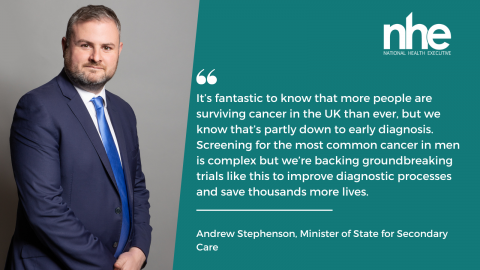A new prostate cancer screening trial is looking to revolutionise diagnosis for the disease and save the lives of thousands of men every year.
The £42m TRANSFORM trial will test innovative approaches and compare them to current NHS practice.
Previous research has shown that current blood tests – prostate-specific antigen – can help prevent 8% and 20% of prostate cancer deaths, although this depends how often men are screened.
Researchers believe the innovative approaches, which will include faster versions of MRI scans (Prostagrams) and genetic testing, have the potential to more than double this impact and cut prostate cancer deaths by 40%.
The first stage of the trial will compare the testing approaches over three years and evaluate which methods will be taken forward into the second stage.
The second stage will investigate the most promising approaches on up to 300,000 men over a 10-year period.
The organisations funding and support the trial include:
- Prostate Cancer UK
- National Institute for Health and Care Research (NIHR)
- Movember
- Freddie Green and Family Charitable Foundation

Professor Lucy Chappell, the NIHR’s CEO, said: “This important trial aims to prevent thousands of men dying each year through earlier diagnosis of one of the most common male cancers.
"Early detection through screening is crucial in improving the life chances of all men, and is particularly important for Black men who are at double the risk of being diagnosed with prostate cancer.”
Figures show that one in four Black men will develop prostate cancer, which is twice the rate of other men – due to this, one in 10 men invited to take part in the trial will be Black.
Six of the world’s leading prostate cancer researchers will spearhead the trial, which is thought to be the largest undertaking in its field in the last 20 years.
A biobank of samples, images and data will be collected at an unprecedented scale, which could catalyse a new wave of discoveries and innovation. Recruitment will begin next year.
Director of research at Prostate Cancer UK, Dr Matthew Hobbs, commissioned the trial. He said: “Prostate cancer is the most common cancer without a screening programme and it’s about time we changed that.
“We know that earlier diagnosis saves lives, but previous trials haven’t been able to prove that enough men would be saved using PSA tests alone, while they did show that these old screening methods caused significant unnecessary harm to men.
“We must now prove that there are better ways to find aggressive prostate cancer that will save even more lives while causing less harm.”
The latest innovations coming from clinical trials, genomics and the life sciences industry will be detailed at an exclusive online conference hosted by National Health Executive later this year. Register to gain expert insight.
Image credit: iStock



















